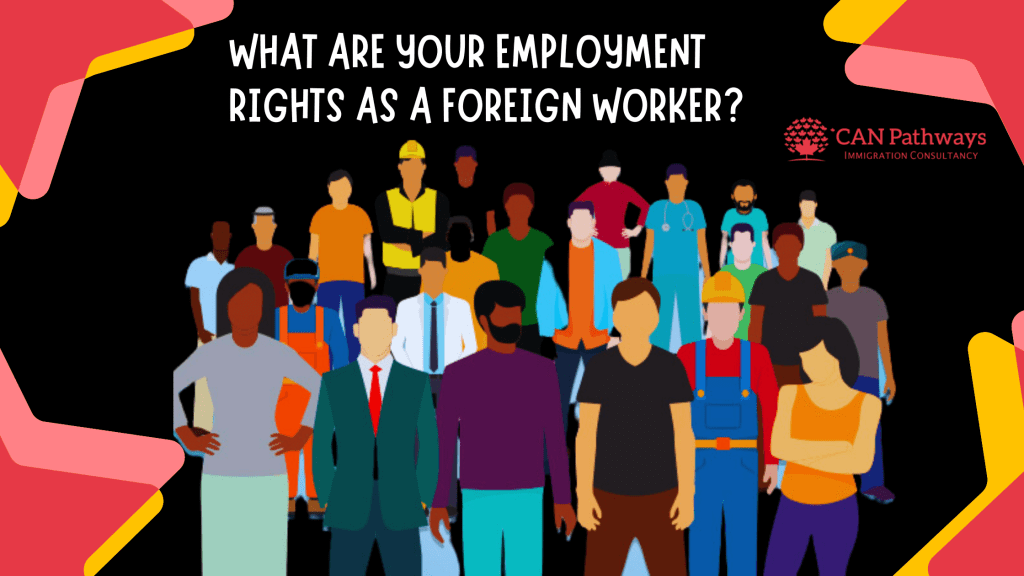In Canada, everyone is entitled to be treated equally in their workplace without prejudice or mistreatment. As a foreign worker, you are entitled to the same rights and protections as a Canadian. Here’s what you need to know about your employment rights and how they might differ from your home country.
Legislation
The Canada Labour Code is a set of laws created by the federal government, which outlines the rights and obligations of employers and employees operating in federally regulated industries such as banks and telecommunications companies.
However, labor laws are established by the respective provinces and territories for most other occupations. Each province or territory has labor and employment laws addressing fair compensation, working hours, and working conditions.
The employment Equity Act and Federal Contractors Program are two legal measures in Canada that require employers to promote equal employment opportunities for specific groups of individuals.
These measures mandate federally regulated companies and organizations to provide equitable opportunities for ladies, Indigenous people, disabled people, and members of visible minorities.
Rights for Foreign Workers
All workers in Canada, regardless of their nationality, are safeguarded under Canadian laws. This includes foreign workers, who have the following rights:
- To receive compensation for their work
- To work in a safe environment
- To retain their passport and work permit
Before starting work, employers must provide foreign workers with a copy of their employment agreement. This agreement should include details about the worker’s job, remuneration, and working conditions. It must be signed by both the worker and the employer and presented in English or French.
Moreover, employers are required to give reasonable notice before dismissing a foreign worker. Failure to do so will result in the payment of termination pay, which depends on the length of the worker’s employment and the province or territory where they work.
Health and Safety Rights
Your employer is responsible for ensuring a secure and healthy work environment and providing adequate training to perform your job safely. This includes equipping you with the necessary protective gear and training you on operating any equipment or machinery, where applicable.
You have the right to refuse to work in conditions that you believe to be hazardous, and you cannot be terminated or denied payment for exercising this right.
If you observe potential workplace risks, your employer must investigate and address the issue. You may refuse to work until both you and your employer agree to the following:
- The risk has been eliminated, and the issue no longer exists; and
- You have been provided with the required training and equipment.
Abuse Free Workplace
Your employer must take reasonable measures to create a work environment free of mistreatment. This implies that neither your employer nor any individual acting on their behalf can engage in physical, sexual, psychological, or financial abuse against you.
As per the Canadian government website, any conduct that intimidates, controls, or isolates you may constitute abuse. Examples provided on the website include:
- Inflicting physical harm
- Uttering threats or using insults
- Inappropriate sexual contact
- Exercising control over your movements and social interactions
- Stealing from you
- Withholding your owed wages
- Confiscating and refusing to return your passport, work permit, or other identification documents
- Coercing you into committing fraud
- Threatening or taking disciplinary actions, demotions, or dismissal due to reporting non-compliance or lodging complaints about working conditions or abuse.
Duty To Accommodate
In certain circumstances, differential treatment is necessary to prevent or diminish discrimination. An employer may need to alter their work environment or responsibilities to enable employees to perform their job.
This requirement to adjust is the duty to accommodate and pertains to discrimination-related needs. In the Canadian Human Rights Act, there are 11 specified grounds for discrimination:
- Race
- Marital status
- Skin color
- Religion
- Age
- Gender
- National or ethnic origin
- Sexual orientation
- Disability
- Family status
Reporting Employment Problems
If you have been required to perform hazardous work, your working conditions are insecure, or you have sustained an injury or illness due to your job, you should notify your provincial or territorial workplace health and safety authority to report the issue.
If you believe you are not receiving adequate payment, are being treated unfairly, or your employer is violating your employment contract, you should contact your provincial or territorial employment standards office.
Most provinces and territories provide workers with compensation benefits, which are payments to compensate for lost earnings when workers suffer injuries or illnesses in the workplace. It is against the law for your employer to prevent you from submitting a worker’s compensation claim.
Conclusion
The right to work in Canada is a fundamental human right. You can be provided with safe working conditions and fair compensation as a worker. If you are not receiving these entitlements, you may file a complaint with the appropriate authority or seek legal counsel to seek justice and get the compensation you deserve.
These are your rights as an employee working in Canada. As a worker, you also have the responsibility to abide by your employer’s rules and regulations. When making your first steps in Canada and searching for a job, you must know what rights and responsibilities you must follow. Learning about these rights is key to advancing an individual’s career in Canada.








